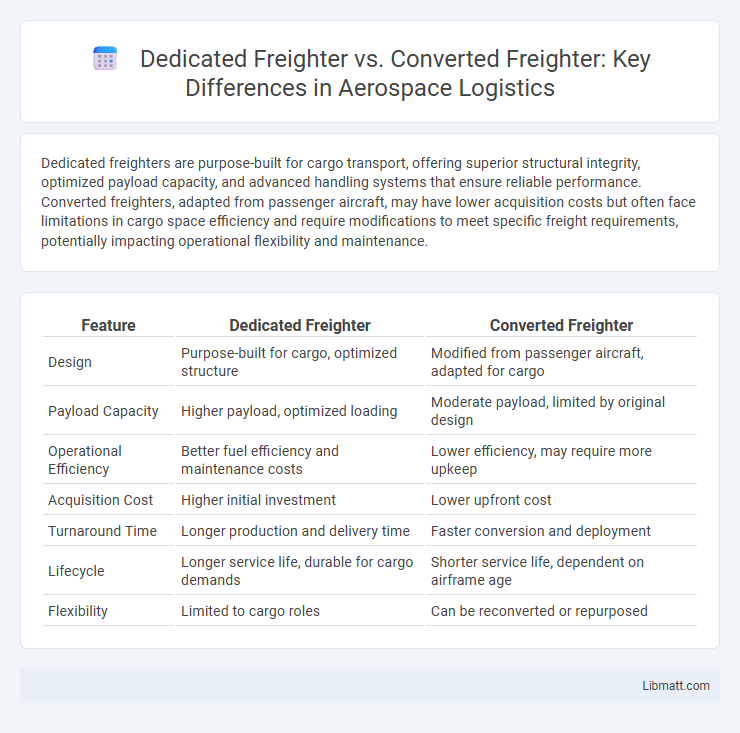Dedicated freighters are purpose-built for cargo transport, offering superior structural integrity, optimized payload capacity, and advanced handling systems that ensure reliable performance. Converted freighters, adapted from passenger aircraft, may have lower acquisition costs but often face limitations in cargo space efficiency and require modifications to meet specific freight requirements, potentially impacting operational flexibility and maintenance.
Table of Comparison
| Feature | Dedicated Freighter | Converted Freighter |
|---|---|---|
| Design | Purpose-built for cargo, optimized structure | Modified from passenger aircraft, adapted for cargo |
| Payload Capacity | Higher payload, optimized loading | Moderate payload, limited by original design |
| Operational Efficiency | Better fuel efficiency and maintenance costs | Lower efficiency, may require more upkeep |
| Acquisition Cost | Higher initial investment | Lower upfront cost |
| Turnaround Time | Longer production and delivery time | Faster conversion and deployment |
| Lifecycle | Longer service life, durable for cargo demands | Shorter service life, dependent on airframe age |
| Flexibility | Limited to cargo roles | Can be reconverted or repurposed |
Introduction to Dedicated and Converted Freighters
Dedicated freighters are aircraft specifically designed and built for cargo transport, featuring optimized cargo holds, reinforced floors, and large cargo doors to maximize payload efficiency. Converted freighters are passenger aircraft modified to carry freight, involving structural reinforcements and installation of cargo handling systems but retaining many passenger aircraft characteristics. The choice between dedicated and converted freighters impacts operational costs, payload capacity, and maintenance requirements in the air cargo industry.
Defining Dedicated Freighters
Dedicated freighters are purpose-built aircraft designed exclusively for cargo transport, featuring reinforced floors, large cargo doors, and optimized layouts that maximize payload capacity and efficiency. Unlike converted freighters, which are modified from passenger airplanes, dedicated freighters offer enhanced durability, better fuel efficiency, and greater operational reliability. Your logistics strategy benefits from these advantages, ensuring smoother and more cost-effective cargo operations.
Understanding Converted Freighters
Converted freighters are passenger aircraft that have been retrofitted for cargo transport, offering a cost-effective alternative to dedicated freighters designed specifically for freight. These conversions typically involve removing seats, reinforcing floors, and installing cargo doors, allowing airlines to extend the service life of older passenger jets while meeting growing air cargo demand. Airlines benefit from quicker acquisition times and lower upfront costs compared to purchasing new dedicated freighters, although converted freighters might have limitations in payload capacity and fuel efficiency.
Key Differences between Dedicated and Converted Freighters
Dedicated freighters are purpose-built aircraft designed from the ground up for cargo transport, featuring reinforced floors, large cargo doors, and optimized loading systems to maximize payload efficiency. Converted freighters originate as passenger planes modified to carry freight, often resulting in cost savings but with potential compromises in cargo capacity and operational flexibility. Understanding these differences helps you select the ideal freighter type based on factors like budget, payload requirements, and route structure.
Cost Analysis: New-build vs. Conversion
New-build dedicated freighters generally demand higher upfront investment due to custom design and advanced technology integration, resulting in greater long-term efficiency and lower maintenance costs. Converted freighters offer a cost-effective alternative by repurposing existing passenger aircraft, significantly reducing initial expenditure but potentially increasing operational costs and limiting payload optimization. Your choice between dedicated and converted freighters hinges on balancing immediate budget constraints against overall lifecycle cost savings and performance needs.
Cargo Capacity and Configuration Comparison
Dedicated freighters boast optimized cargo capacity with layouts specifically engineered for freight, providing higher payload limits and enhanced volume efficiency than converted freighters. Converted freighters repurpose passenger aircraft, resulting in constraints on cargo space and weight distribution due to structural and configuration compromises. Dedicated freighter designs enable tailored cargo hold configurations and reinforced flooring, maximizing both capacity and operational efficiency for freight transport.
Operational Efficiency and Performance
Dedicated freighters offer superior operational efficiency with optimized aerodynamics, fuel consumption, and cargo handling systems tailored specifically for freight transport. Converted freighters, typically modified from passenger aircraft, may experience limitations in payload capacity and cargo loading speed, impacting overall performance. The specialized design of dedicated freighters results in enhanced turnaround times and lower maintenance costs compared to converted freighters.
Maintenance and Lifecycle Considerations
Dedicated freighters feature airframes and systems designed specifically for cargo operations, resulting in streamlined maintenance and extended lifecycle durability compared to converted freighters. Converted freighters, adapted from passenger aircraft, often require more frequent maintenance due to structural modifications and older airframe usage, potentially increasing operational costs over time. Your choice impacts long-term maintenance schedules and lifecycle planning, with dedicated freighters generally offering greater reliability and lower maintenance complexity.
Market Demand and Fleet Trends
Dedicated freighters consistently dominate market demand due to their optimized design for cargo operations, offering superior payload capacity and fuel efficiency compared to converted freighters. Fleet trends reveal a steady increase in new dedicated freighter orders driven by e-commerce growth and express delivery needs, whereas converted freighters remain a cost-effective solution for airlines seeking rapid capacity expansion. Your strategic choice between these options should consider long-term operational efficiency versus flexibility and initial investment constraints.
Choosing the Right Freighter: Factors to Consider
Choosing the right freighter involves evaluating factors such as payload capacity, operational costs, and maintenance requirements. Dedicated freighters, designed specifically for cargo transport, offer optimized loading efficiency and lower lifecycle costs compared to converted freighters, which are modified passenger aircraft. Airlines must also consider fleet flexibility, turnaround times, and regulatory compliance when deciding between dedicated and converted freighters.
Dedicated Freighter vs Converted Freighter Infographic

 libmatt.com
libmatt.com